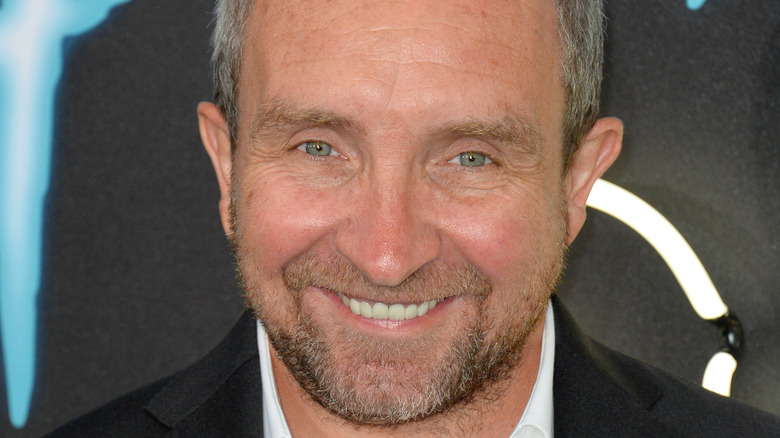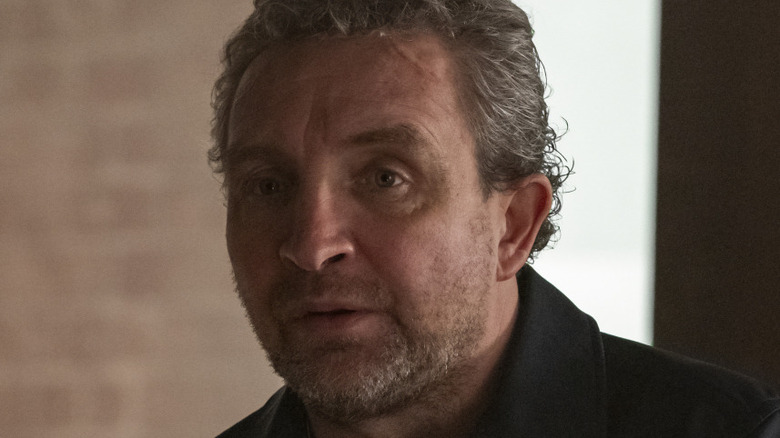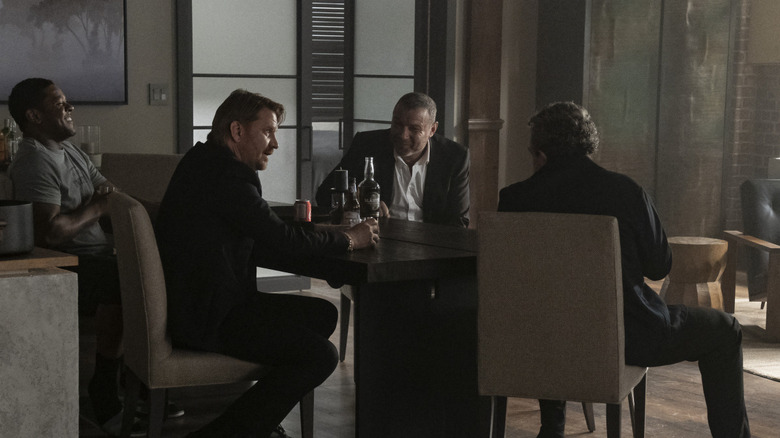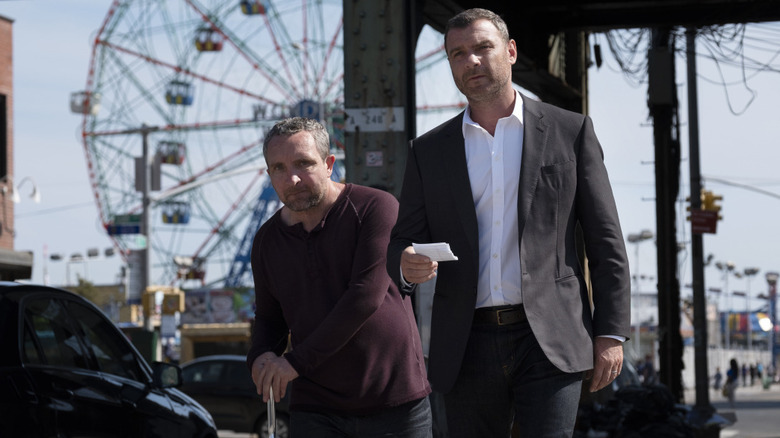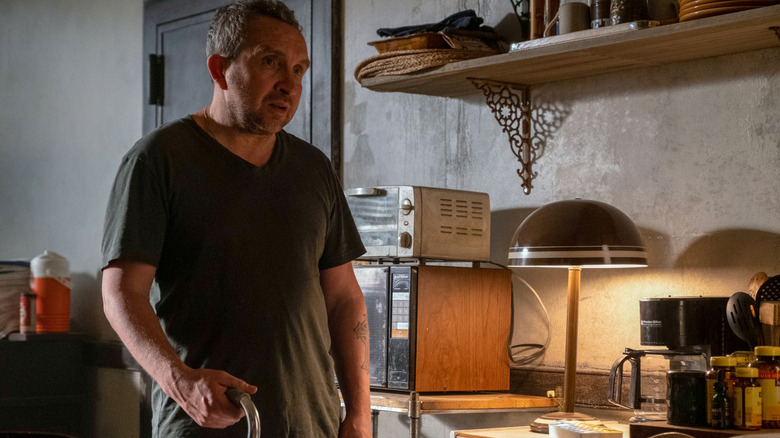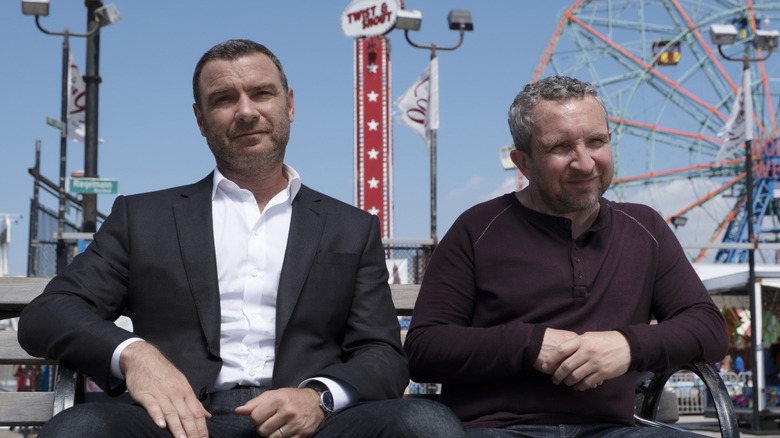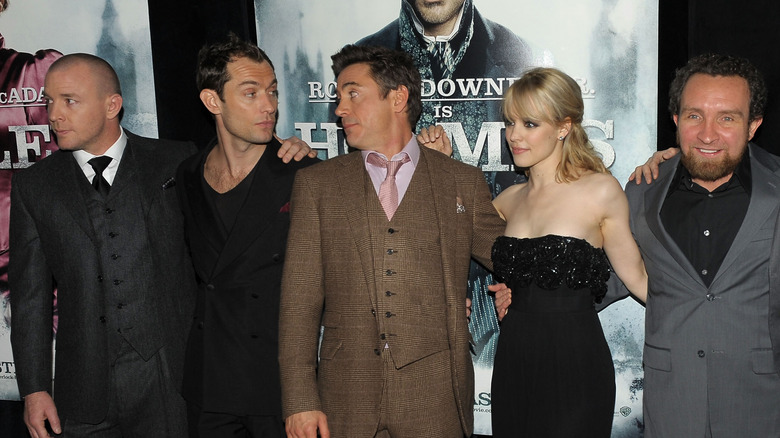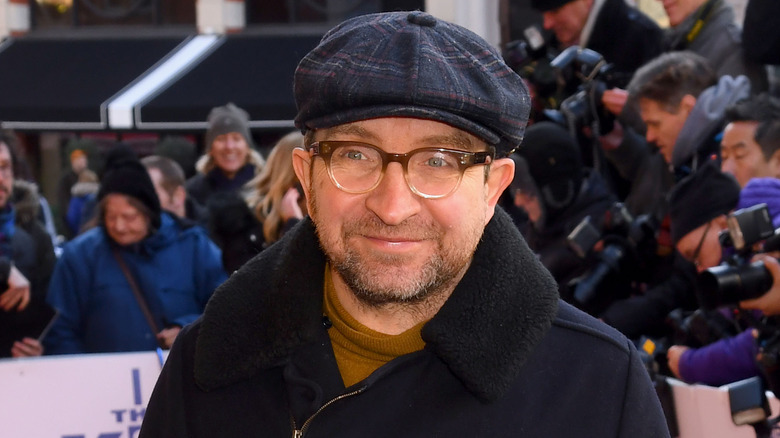Eddie Marsan Discusses Reviving Ray Donovan, Female Fans, And Disability Representation - Exclusive Interview
When "Ray Donovan" was canceled, there was an immediate uproar from fans, particularly because Season 7 ended on such a major cliffhanger. Luckily, Showtime took notice of the "Donofans" and decided to bring back the beloved property for "Ray Donovan: The Movie," which is available to stream exclusively on Showtime.
Having starred on "Ray Donovan" from the very beginning, Eddie Marsan was elated when he got to play Terry Donovan once more, this time in a movie installment. Whether or not fans will be happy with the way "Ray Donovan: The Movie" ends remains to be seen, but it's clear that the show and its characters are adored by people all over the world.
Looper caught up with Eddie Marsan to find out what it was like reuniting with his "Ray Donovan" family, what it was like working with Jason Statham and The Rock on "Fast and Furious: Hobbs and Shaw," and how it feels to be a part of Guy Ritchie's "Sherlock Holmes" movies alongside Robert Downey Jr.
The end of Ray Donovan?
As a big "Ray Donovan" fan, I was devastated, as was everyone else, when it was canceled. How did it feel to be brought back for the movie?
Vindicated ... I think we all felt that the story hadn't been finished, that our work hadn't been honored, really. [We] needed to complete the story, and then suddenly, when there was the uproar, it felt quite nice because it felt like we were loved. It was very nice of Showtime to give us two hours.
And do you feel like fans will be satisfied with the ending of "Ray Donovan: The Movie" and have all their questions answered?
I suspect that there's more life to it than this, I suspect there is. Have you seen the ending? I haven't seen it yet because I'm in the UK, so I'm kind of ... everyone else is in America and that's always happened. I've always missed this, missed the ship when it came out. I think that there's more life to it. I don't know if that's going to happen ... it's above my pay grade, but I think there's more life to it.
Terry Donovan's maternal role
Terry's role in the movie is quite solitary, and it sees him reflecting on his family and those that are no longer there. What was the thinking behind that, and were you happy with the way his story was left?
If it would've been a 10-episode, 12-episode season, then Terry's arc would've been more substantial. As it were, we all had to share a two-hour movie, and there's something poetic about Terry anyway. We always play Terry — not only me, but the writers and directors — Terry was always the mother of the family. There's something quite feminine about Terry, although he's really an alpha male, tough guy, there's something about him also, he's basically the mother of the family. Him being at home, remembering everybody, and cooking a meal is, I think, quite appropriate.
What's been your favorite thing about playing Terry?
I really enjoyed getting into the character. I really enjoyed playing the contrast of being Terry, being somebody who has a disability and yet is really physically quite capable. [He's] somebody who has a very, very maternal nature and yet is a hard [guy]. The contrast in Terry, the masculine and the feminine, those things, the complexity is what I can tell.
Portraying Terry's Parkinson's
I'm disabled and I really relate to so many of the things that Terry's been through [as a person with a neurological disease]. How did you prepare to play a disabled character?
Well, the physical disability that Terry had was a manifestation of psychological trauma. In a sense, I linked the two very early on. Whenever I created the physicality of Terry, and the physical disability, it was always linked to a psychological disability and the psychological trauma. They became symbiotic as the show went on, so that they always had a very clear link. That's what makes it better. It made it easier for me as an actor, one would feed off the other, and make it richer.
Then, we would just research every season. We would go and speak to people who were suffering from Parkinson's, doctors who were looking at treatments, looking at the progression of the disease, the side effects of the medication, symptoms, all these things. We took great care and great responsibility ... And I've been really pleased [that] a lot of people who suffer from Parkinson's, or are suffering from Parkinson's or their family members have suffered from Parkinson's, have really been touched by Terry.
becoming Terry Donovan
There's a big discussion about whether disabled actors should play disabled characters, but I think it's more important to get the representation right, and have those complex characters like Terry, that have this full life, that have so many different issues going on. That, to me, is more meaningful.
I think one of the issues — I understand that — but what Terry is, he's an ex-boxer, professional boxer, who was sexually abused by a priest. He comes from Boston, and he suffers from Parkinson's. Where are you going to find somebody who has been a professional boxer, comes from Southie, and then has Pugilistic Parkinson's, but also has got 30 years experience as an actor to be able to control that in front of the camera?
It's not reality TV, it's art, and also, I've got experience. One of my close friends I saw die of Parkinson's, so it's very close to me anyway. Acting isn't only about authenticity. It's the ability to portray it, and it's a blurred line.
I agree ... because there aren't many shows that I can turn to that would have a disabled character like Terry, that ... have so many empowering moments, as well as so many low moments. I think that's more important because we don't get that representation otherwise.
It was great for him not to be a victim.
Finding a female fan base
One of my favorite Terry moments from "Ray Donovan" [Season 3, Episode 2] is when he is in prison, and everyone completely underestimates him and he just basically kills them all. I was like, "that's what I want to see."
Yeah, and it's so funny. I've always been a character actor. I've never had a female fan base, but suddenly, when I played Terry, I suddenly had a female fan base, who really really loved Terry. They get quite disappointed when they meet me and they discover I'm not him.
The cast seems very close and you've all worked together for almost a decade. Was it difficult saying goodbye? I know you've hinted that it might not be goodbye, but how emotional was it?
It was quite emotional. On my last day, I was with Dash [Mihok] and Kerris [Dorsey] and yeah, it was very emotional. I think it'd been nine years and ... I felt very proud. They are like family, it's really weird. You become like a family, you do. I know that's a cliché, but you really do become like a family and you grow up together. So yeah, it was very sad, but I don't think it's over. I look at this and think, if this is a success, if this two-hour film is a success, and people love it, they don't need to do 12 episodes every year. They can do one film a year, and they've got to keep subscribers so I suspect they may well do it. I mean, they may not, but we'll see. It depends on whether all of us are available.
Working with Guy Ritchie
You've worked with Guy Ritchie on many occasions. What's your working relationship with him like?
I enjoy working with him. It's a very practical working relationship. I know that sounds obvious, but what I mean is, I know exactly what my job is. When he's got a big job going on, he gets me in and says, "Can you take care of that, Eddie?" and leaves me to it. That's what a lot of people do with me. They get me in. They've got big effects or a big star, or something they've got to focus their attention on, and so they literally go, "Eddie, you've got this part, can you do that?" Okay, and they don't worry about it. That's how I earn my living.
To be honest with you, there's lots of actors like me. Watch the movie business. It's very easy to find the stars because everybody wants to be a star. It's very easy to cast the small parts because the guys just starting out are desperate to get on the movie set, but the real life love of the acting industry are people like me, and I'm one of thousands where we're really good craftsmen, just good at our job. We're kind of like session musicians. We turn up and make it sound good.
Sharing a set with Jason Statham and The Rock
You're in Guy Ritchie's "Sherlock Holmes" movies. What was it like working with Robert Downey Jr. and getting to be a part of those?
It was very good. There was lots of improvisation, especially in the first one, there was lots of improvisation. We were exploring characters, the relationship between Lestrade and Holmes, and we had lots of fun. He was very creative.
You were also in "Fast and Furious: Hobbs and Shaw," and you work with Jason Statham quite a lot. What was it like getting to work with him and The Rock?
I enjoyed it. It's so funny, I work every time with, I have a voice coach, who's 6'9". My 6'9" voice coach, who is gay and very flamboyant, so it was great fun to be on a really macho set with Jason and The Rock. My wife calls him my gay husband; we had great fun. ... Jason's a very, very sweet man, he's a very quiet man, plays a lot of chess on set. Very unobtrusive. He is very gentle. He's very intelligent, well, much more intelligent than me, I hate to say.
Obviously, you've worked with some amazing directors like Terrence Malick and Martin Scorsese. Is there anyone you haven't worked with yet who you would like to?
Yeah, I'd like to work with Todd Solondz, I think. I'd like work with Steve McQueen too, I think he makes amazing movies. And Shane Meadows.
"Ray Donovan: The Movie" is available to stream exclusively on Showtime.
